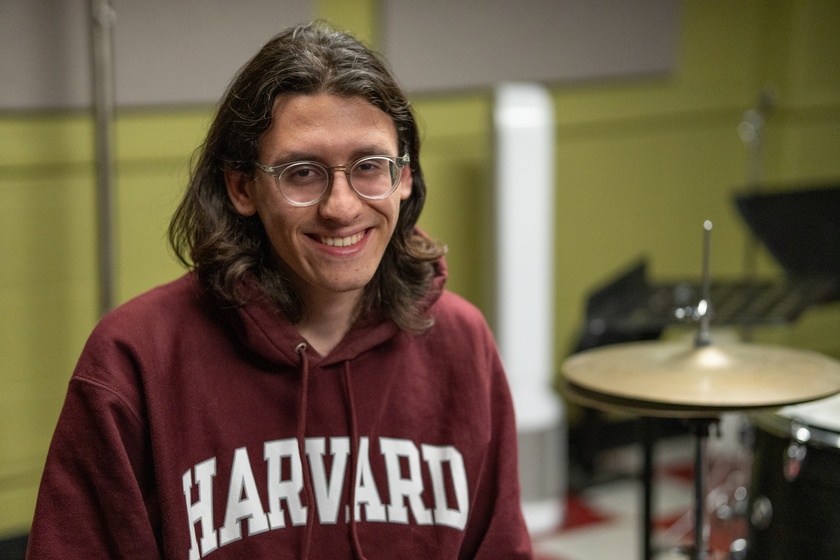{shortcode-0839573338ab2745a678bb2733332852c36acfb6}
{shortcode-3f3e57005be88db1897fbe0aab6a26f27b883007}utterflies are beautiful. Helen is beautiful; therefore, Helen is a butterfly. Zachary “Zach” B. Halberstam ’25 shares this syllogism with me — a lesson on subjective truth he learned in a German class. As a math concentrator drawn to formulaic ways of thinking, the metaphor stuck with him.
“Here’s how non-literal, subjective truth can be placed into this position where at first it would seem ridiculous,” he says. But then he poses the question: “In what sense can I privilege the thing that I call this objective, mathematical truth over it?”
In many ways, Zach’s experience at Harvard has been negotiating with those two spheres, applying a precise mathematical mind to creative pursuits.
Zach is a mathematician. He is a lyricist. He is a physicist, occasionally. He is a saxophone player. He is a stage director and staple of the Leverett dining hall.
He cultivated this range of interests growing up in Ann Arbor, Mich., where he was lucky enough to have access to the “best high school band program you could possibly imagine,” as well as the University of Michigan. “I wouldn’t be from anywhere else,” he says.
After all, exposure to a university allowed him to enter Harvard with 40 credits of college math under his belt. During his time here, his scholarship has run the gamut from graduate math courses to Germanic literature, and for a time he was a double concentrator in Math and Social Studies.
Zach’s academic reputation precedes him. He is the recipient of Harvard’s Wendell Prize, granted to a sophomore who is identified as “the most promising and broad-ranging scholar” in the student’s class. Yet he tells me that his greatest accomplishment in college was co-directing “Constellations,” a multiversal romance play that ran last spring.
The play was one of those moments when, he says, “I just really did something to the absolute best of my ability, where I really had the time, had the energy — the stars aligned.” (No pun intended.)
Naturally, Zach brought a high level of precision to each step of the directing process. He determined the placement of a bench by treating it as a rigid problem in plane geometry. While mapping out the angles of the bench on the shuttle to a CS181 midterm, a classmate looked over and asked if he was practicing a problem on support vector machines.
Beyond directing, Zach wrote the lyrics for the First-Year Musical and is currently working on lyrics for the Hasty Pudding Theatricals show. He finds the experience of writing lyrics works hand in hand with math.
“They both trace down to a set of skills,” he says. “There are only two reasons I have any ability to do this. I am willing to try very hard at things and to persevere, and I have good attention to detail. That was literally it. And I do think that those are the two skills that you really need to be a mathematician.”
But even as Zach excels in both math and the humanities, he struggles to reconcile the objective and subjective truths they create. The inevitable prioritization of one type of truth-seeking over another in scholarship is both liberating and constricting for him.
“Whatever field I ultimately choose to go into, I’m going to have to give up some amount of that in favor of one specific approach,” he says. “I think something that’s been important to me has been engaging with these different versions and thinking about what the implications are.”
I gain a glimpse into Zach’s thirst for truth when he shows me the centerpiece of his thesis: the Mandelbrot set, a concept which he begins to explain to me before we both realize it would take too long. “I want to explain to you my thesis, and I know that I could. I’m not sure if it’s useful for Fifteen Minutes,” he says. Fair enough. We leave it at the fact that a Google search of the Mandelbrot set generates pretty pictures.
Zach also recognizes that while such an interdisciplinary approach to his education has been productive for him, there’s nothing inherently better about being a “renaissance person.”
“A lot of different areas have a lot to offer, and exploring them is a really worthwhile thing to do, and I’ve chosen to do that,” he says.
“I don’t think any of the well-roundedness that I have makes me any better than anyone else,” he adds.
For all the complexities of his endeavors, whether studying the nuances of mathematical fractals, playing the saxophone in the Leverett band room, or analyzing the legends of German literature, Zach boils his passions down to just a few short sentences. “I like to create. I like things that are beautiful. I like to work collaboratively, and I like to help other people,” he says. It sounds like a gross simplification of all that he has accomplished, but it covers everything we talked about.
— Associate Magazine Editor Kyle L. Mandell can be reached at kyle.mandell@thecrimson.com.


